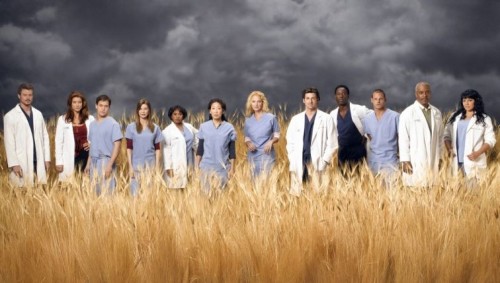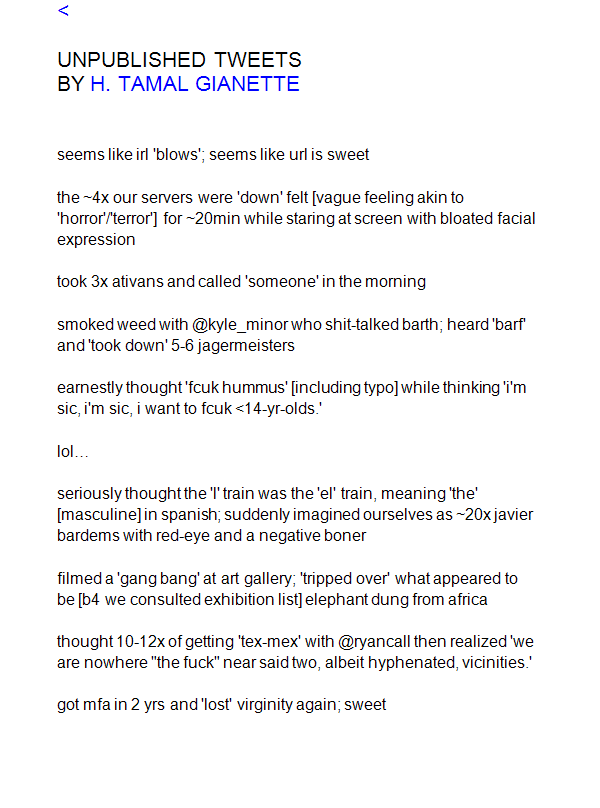Nabokov on Collaboration
(from the Foreword to Lolita: A Screenplay):
By nature I am no dramatist; I am not even a hack scenarist; but if I had given as much of myself to the stage or the screen as I have to the kind of writing which serves a triumphant life sentence between the covers of a book, I would have advocated and applied a system of total tyranny, directing the play or the picture myself, choosing settings and costumes, terrorizing the actors, mingling with them in the big part of guest, or ghost, prompting them, and, in a word, pervading the entire show with the will and art of one individual–for there is nothing in the world that I loathe more than group activity, that communal bath where the hairy and slippery mix in a multiplication of mediocrity.
Gerhard Richter on Writing

“The idea that art copies nature is a fatal misconception. Art has always operated against nature and for reason.”
“Surely you don’t think that a stupid demonstration of brushwork, or of the rhetoric of painting and its elements, could ever achieve anything, say anything, express any longing.”
“I never worked at painting as if it were a job; it was always out of interest or for fun, a desire to try something.”
“I have to have a mental picture, an image, to start. I never reach this image, but it’s good to begin with it.”
“Form is all we have to help us cope with fundamentally chaotic facts and assaults. Formulating something is a great start. I trust form, trust my feeling or capacity to find the right form for something. Even if that is only by being well organized. That too is form.”
“Strange though this may sound, not knowing where one is going, being lost, being a loser, reveals the greatest possible faith and optimism, as against collective security and collective significance. To believe, one must have lost God; to paint, one must have lost art.”
“I want to leave everything as it is. I therefore neither plan nor invent; I add nothing and omit nothing. At the same time, I know that I inevitably shall plan, invent, alter, make and manipulate. But I don’t know that.”
“I don’t create blurs. Blurring is not the most important thing: nor is it an identity tag for my pictures. When I dissolve demarcations and create transitions, this is not in order to destroy the representation, or to make it more artistic or less precise. The flowing transitions, the smooth, equalizing surface, clarify the content and make the representation credible (an alla prima impasto would be too reminiscent of painting, and would destroy the illusion).”
“When I first painted a number of canvases grey all over I did so because I did not know what to paint, or what there might be to paint: so wretched a start could lead to nothing meaningful. As time went on, however, I observed differences of quality among grey surfaces, and also that these betrayed nothing of the destructive motivation that lay behind them. The pictures began to teach me. By generalizing a personal dilemma, they resolved it. Destitution became a constructive statement; it became relative perfection, beauty, and therefore painting.”
“How could one be in this world without feeling dismayed by it? Even if one paints flowers and gingerbread.”
“Talk about painting: there’s no point. By conveying a thing through the medium of language, you change it. You construct qualities that can be said, and you leave out the ones that can’t be said but are always the most important.”
“It is hard, say, to cross out six different numbers on a Lotto ticket in such a way that the arrangement looks convincing. And yet the sequence that emerges after the numbers are drawn seems entirely right and credible in every way.”
Q: What painters have you learned from?
A: “From every one that I know.”
“What I’m attempting in each picture is nothing other than this.. to bring together in a living and viable way, the most different and the most contradictory elements in the greatest possible freedom.”
4 things that sorta suck
11. Being a big fish in a small pond. It’s not the same anymore. Because you are going to meet the internets. And the internets is an ocean. So now you’re not a big fish.
2. Black Swan. Because you didn’t learn anything about the ballet world you didn’t know. Every non-ballet world reader here, if asked to write the screenplay, would have thought: Well…bulimia, fucked up toes and shoes, domineering director dude with European flair, bitchy colleagues, when you’re age thirty you’re done, skinny. Well, no shit. Oh, and I wish the director had never seen Sixth Sense. Oh, and ha-ha, the director laughs, the unreliable narrator is really mentally ill and I don’t really have a focus here and we need to prove Natalie really isn’t Queen Amidala so could you arch your back higher in those panties, etc.? I’m just happy he didn’t end it with “And then she awakes” which you know he did and loved in some outtake we’ll see later on DVD. Oh, and Winona Ryder is grossly miscast or possibly just medicated for Kleptomania/busy picking such a meaty, meaty role out of her eyeteeth. Oh and…and oh, fuck it.
1. That Sebald WG died at age 57. But these guys retraced his funk-gloom walk of The Rings of Saturn. This doesn’t suck, as you will see, but it sucks for me that we are doing retrospective ideas on a writer recently loved (by me, fer sure) alive and writing new words.
4. Wendy’s new fries. I’m getting a New Coke feel. It’s a conspiracy of suck to make us like their old fries. The new fries hold the brown of bundled mortgages and taste like a committee or cat litter or a committee of cat litters. Something to make you doubt your ways.
The second to last paragraph in a provocative post by Jonah Lehrer: “I think this research helps explain why the era of the lone genius is coming to an end. If our current lists of global thinkers seem paltry, it’s because the best thinkers no longer exist by themselves, toiling away in a vacuum. Instead, they require the constant feedback and knowledge of others. We live in a world of such complexity that our problems increasingly exceed the possibilities of the individual mind. Collaboration is no longer an option.” Hop over, read the whole thing. What do you think?
Occupation: Writer & the Myth of the Writer: Two Semi-Related Ideas Smashed into One Post
Thinking over Andrew’s post about his experience at New School’s MFA, I’ve been considering why I decided to become a writer.
Yesterday, for no reason at all, I remembered this conversation I had with a high school friend seven years ago, right before I started my MFA. He was on break from university (Columbia). We texted back and forth about meeting for a coffee. He said something ridiculous like: I can’t meet on Thursday until after 10 because I have to watch Grey’s Anatomy. When we finally did meet up, he told me something ridiculous like: I just love Grey’s Anatomy so much I’m going Pre-Med so I can have that experience. (And what’s not to want: beautiful doctors sexing each other up all day long and periodically doing some crazy cool, ground-breaking surgeries. I’m sold. Sign me up.)
I say it’s ridiculous, but how ridiculous is it? Why did you start writing? Why do any of us choose our occupations? How much of it has to do with popular media portrayals of certain occupations? (Yes, I realize this is a privileged position. I had a choice. Some people don’t have that choice. I don’t think this undermines my point though.)
I decided to become a writer because when I was eighteen, my college roommate was a poet and all the boys were crazy for her. Turns out they followed her around because she’s gorgeous, but lordy, I was convinced that if I became a writer, like her, I’d have boys trailing me too.
REMOVED
The New School asked that I take this down. They did say it violated confidentiality. They were extremely courteous and understanding about the post, its relevance, and my concerns. In short, I’m all good with them.
On the upside, we saw people writing a whole lot, which was my complaint in the first place. (jk)
Bone Bouquet
 In the poem “Uncle B’s Drive-in, Granbury TX,” Kara Dorris writes: “My bra strap slips off a shoulder / the body a cracked egg.” When thinking of Bone Bouquet, a journal of poetry by women, I keep coming back to the line about the cracked egg—thinking of poetry as cracking an egg, of the egg as a body, the body breaking, poetry… a leaking body.
In the poem “Uncle B’s Drive-in, Granbury TX,” Kara Dorris writes: “My bra strap slips off a shoulder / the body a cracked egg.” When thinking of Bone Bouquet, a journal of poetry by women, I keep coming back to the line about the cracked egg—thinking of poetry as cracking an egg, of the egg as a body, the body breaking, poetry… a leaking body.
Another poem in the book—“Tract, Tract” by Emily Skillings—reads:
Every body is a leaking body
Some practices try to control the leaking
but the leaking is too strong
with its five ancillary roots
reaching to the great estuary.
I know because the practices are in my body
much like the leaking.
The attempt to control the body
and the leaking
is sometimes pleasurable,
always futile.
In a post on the Pank Blog, Elaine Castillo wrote, “Refusal to write through it. Refusal to be cured by writing. This mud hole, writing will not drag me from. This wound, writing will not cauterize.”
On one hand, there is the writer-doctor, the one who sutures the wounds, who masters the wildness with words (“The attempt to control the body”). And then there is the leaky blood-poet, the woman who unapologetically spills her blood all over the page, who rubs her cracked egg into paper and offers it up as a poem. Bone Bouquet seems to prioritize the latter.
There is a reaching quality to the poems, a yearning for something beyond The Word, scattered silence meant to open up space for listening. In Arielle Greenberg’s poem, words are liked black coals coughed up by the body, substitutes for The Unutterable yet still, they burn.
Volume 2, Issue 1 features poems by Carolyn Guinzio, Emily Skillings, Jennifer H. Fortin, Leigh Stein, Dawn Pendergast, Arielle Greenberg, Claire Hero, Becca Klaver, Jennifer Firestone, Tamiko Beyer, Kara Dorris, and Dana Teen Lomax. The issue can be purchased here.
January 25th, 2011 / 8:58 pm
Book of Freaks
Jamie Iredell. Future Tense. The Book of Freaks. March.
Oh, hell yes.



